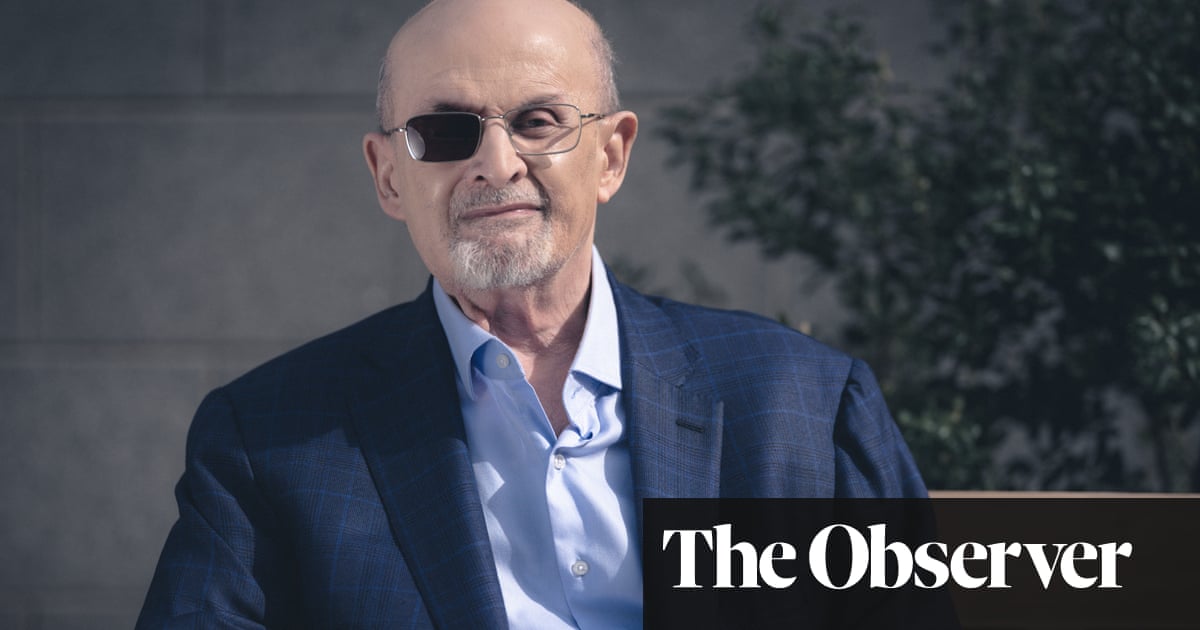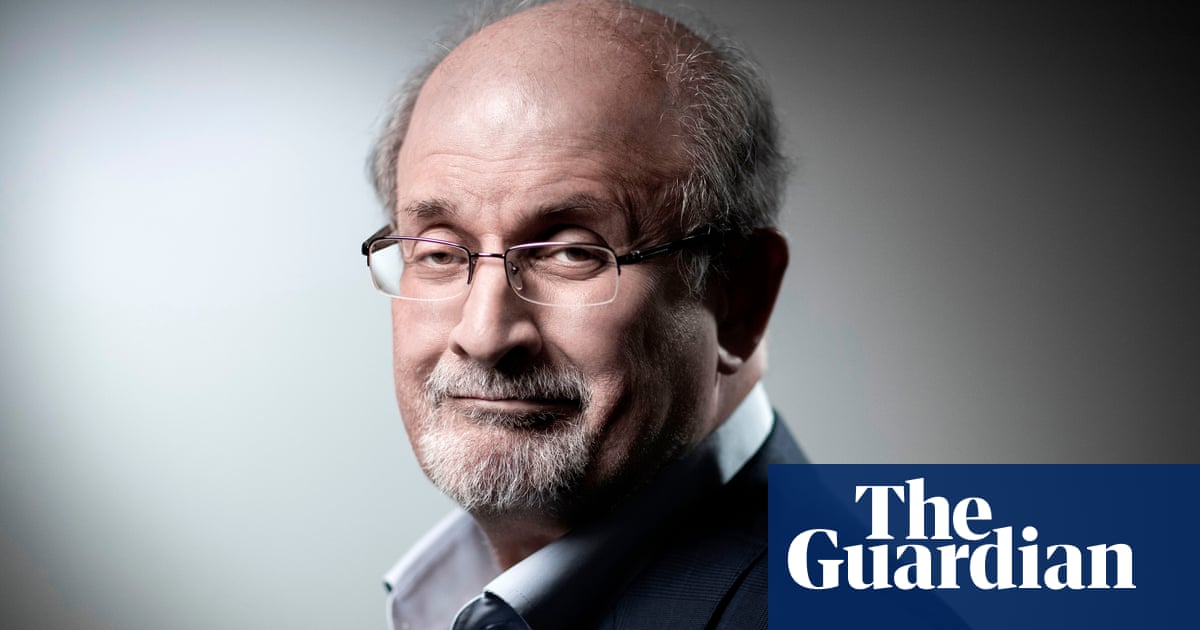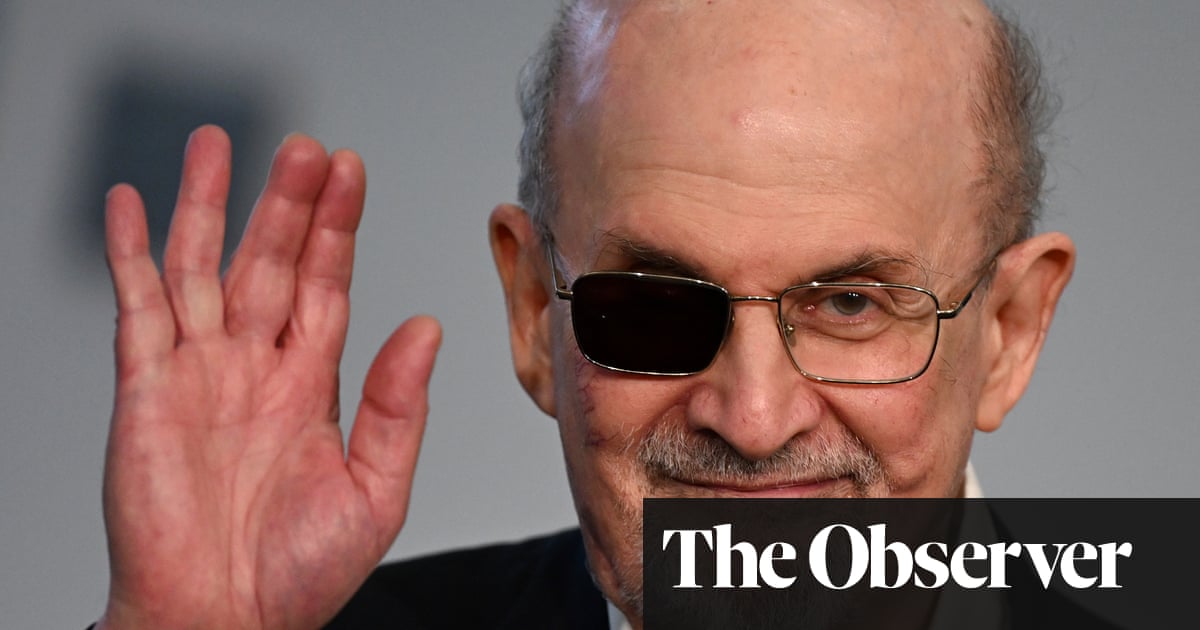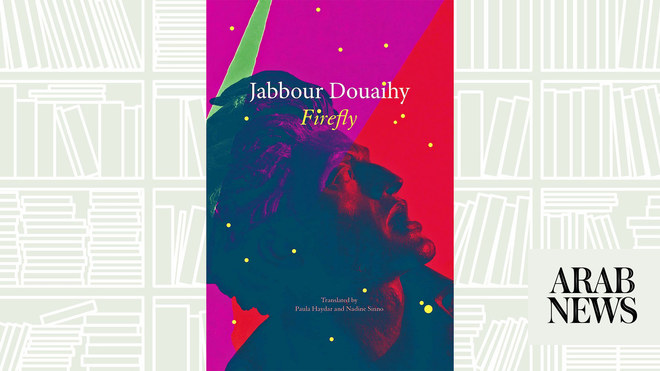
Twelve weeks after the knife attack that almost killed him on 12 August 2022, Salman Rushdie returned to his home in New York. One miracle duly following another, he was fairly soon out and about again: eating (tentatively) and drinking, and generally amazing everyone with his corporeal presence. At a dinner party in Brooklyn, for instance, he saw his old friend Martin Amis, who was then dying of cancer. After this meeting, which would be their last, Amis apparently sent Rushdie an email “so laudatory that I can’t reproduce it all”. What he will tell us, however, is that having expected his fellow writer to be altered, even diminished, by his trauma, Amis was struck by his intactness. Rushdie was, he wrote, entire: “And I thought with amazement, He’s EQUAL to it.”
In his extraordinary new book about the attempt on his life, Rushdie acknowledges that this statement may not have been true – and he’s right, of course. We are no match for horror and violence, just as we’re no match for cancer or any other illness. Such things may only be endured; a body responds (or not) to whatever treatment is available. But in another way, Amis wasn’t wrong. For all that Knife is unsparing of grisly details – when Rushdie describes the initial state of the eye that he lost to his would-be assassin’s blade, lolling on his cheek like “a large soft-boiled egg”, I had to close my eyes for a few moments – what has stayed with me since I finished it has relatively little to do with its author’s flesh and bones. On the page, this could not be anyone but Rushdie. In spirit, he really is, yes, unchanged. The writing is as good as it has ever been, and also (sometimes) as bad. If he appears before us as a courageous person, a true hero of free speech, he is still a bit of a snob and a show-off. The amour propre that was often on display in Joseph Anton, his 2012 memoir of the years when he was in hiding, has not gone away, though perhaps I’m more willing to forgive it now.
How to explain the moment when he makes a point of telling us how much more his family like his new wife than "one or two of the women who preceded her"?
When Rushdie’s agent and staunch friend, Andrew Wylie, visited him in hospital after the attack – it happened on stage at the Chautauqua Institution, as Rushdie was about to give a lecture on the importance of keeping writers safe from harm – he told him with huge certainty he would one day write about what had happened. At the time, Rushdie was unconvinced. But Wylie was also right. At a certain point, he realised there was nothing else to be done but this; that such a book would be his way of taking control. He would meet hatred head-on “with art”. And so Knife was born: at once a fever dream and something cooler and more collected. Those moments of violent “intimacy” with his attacker, who has yet to stand trial and whom he prefers not to name (he calls him “the A”), are vividly recalled, as are the days and weeks in hospital afterwards. There is blood. The “armadillo tail” of a ventilator pipe is pushed down a throat. A lung is drained. An eyelid is stitched closed. A bowel cranks to life and a bladder refuses to do so. Nightmares and hallucinations crowd in. Elsewhere, however, Rushdie is by turns puckish (listen to the sound of his “penis begging for mercy”), sentimental (love will conquer all, he thinks, looking at the faces of those at his bedside) and ruminative (revisiting The Satanic Verses, the cause of the fatwa to which his attacker belatedly responded, he notes once again that a person who is afraid of the consequences of what they say cannot be said to be free). There is some light (and wholly justified) score settling: no, those writers who disagreed with him over the honouring of the French satirical magazine Charlie Hebdo in 2015 by the writers’ organisation PEN International have still not been in touch, even now. More strangely, Rushdie imagines a series of extended encounters with his attacker, in which he quotes Jodi Picoult at him and accuses him of being an “incel”.
For the reader (or this reader, at least) the effect of these different modes is discombobulating, to put it mildly. I was dizzied by the variety of my responses, pity shading into indignation, and straight back again, and while it’s surely part of Rushdie’s point that he wants Knife to be challenging as well as consolatory – his anger, he tells us, has faded; life is all “gravy” now – I cannot think he intended to go this far. How to explain the moment when he makes a point of telling us how much more his family like his new wife, the poet Rachel Eliza Griffiths, than “one or two of the women who preceded her”? (This is his fifth marriage.) How to account for the fact that he seems to think it is charming and funny that Griffiths had T-shirts made for him with the word FINALLY emblazoned on them? (Because his son, Milan, and others said “Finally” when they met her.) In the midst of the grace and dignity he displays elsewhere, this seems tin-eared at best.
The reader may be struck, too, by the inadequacy of words in a case like this: a failing Rushdie at one point notes himself (the notion that what doesn’t kill you makes you stronger is both a cliche and an untruth, he writes). The book is at its best when it is at its most visceral, its author grappling with the earthly, the horribly tangible. When it moves to a higher, more philosophical plane – “Art is not luxury. It stands at the essence of our humanity, and it asks for no special protection except the right to exist”; “I have always believed that love is a force, that in its most potent form it can move mountains” – it’s in danger of banality. There is an uncomfortable disproportionality between the time Rushdie gives to those writers (Ovid, Lorca) he briefly presses into the service of his thoughts on art and freedom, and the main event of his struggle to breathe, to sit up, to walk; his scars, his disfigurement. People should certainly read this book, and I hope that they will, especially those who currently want for cultural courage; who’ve chosen, in recent times, to stay quiet about so many things. But I must warn you that it isn’t so easy to admire as some are saying. Rushdie’s light is undimmed, and while I celebrate this wholeheartedly in life, in Knife it brings with it a certain dissonance.
Knife by Salman Rushdie is published by Jonathan Cape (£20). To support the Guardian and Observer order your copy at guardianbookshop.com. Delivery charges may apply












